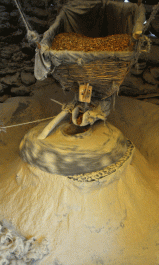Reach Ladakh
Skara Yokma, Airport Road,
Near Councillor Quarter,
India.
Know Your Culture
Oct 30, 2018

Rantak or Churak
‘Rantak’ the traditional watermill of Ladakh is an indigenous machine used for the grinding locally grown cereal crops, wheat and barley to produce the local barley locally known as ‘Ngam-Phey’.
It is made from locally available materials such as wood, stone and iron by the local experts of village. This eco-friendly and safe structure is in use since times immemorial and is still in use in some rural areas.
Rantak are built next to river, stream and tributaries and the water is diverted and is made to rotate the mill. Most of the mills become non functional during the harsh winter season of the region due to freezing of water as well as the turbine.
Sadly, with the onslaught of modernity, centuries old traditional watermills are now disappearing fast. These are now replaced by mechanized mills operated with the help of fossil fuels and electricity.
Advantages:
It is a vital, centuries-old technology, which has zero operating cost as it does not require fuel or electricity.
Traditional watermill does not pollute the environment.
The maintenance is done by the owner himself and the materials required are available in the village.
The taste, texture, flavors and standard of the flour of the watermill is far superior to flour of modern mills
Because the stones grind slowly, the wheat germ is not exposed to excessive temperatures. Heat causes the fat from the germ portion to oxidize and become rancid (Aubert 1989). The flour hence does not get spoiled for years on storage.
Exposure to less temperature also minimizes the loss of vitamins.
Courtesy: Anwar Hussain and Nazir Hussain





